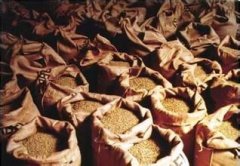The important difference between specialty coffee and commercial coffee is the characteristics of specialty coffee beans.
What are boutique coffee beans? What is the difference between fine beans and commercial beans?
Boutique coffee, translated from English Specialty Coffee, is a proper noun that does not reach the meaning of the word but has no better translation for the time being. it refers to the coffee with special regional flavor grown in the special geographical and microclimatic environment. The term Specialty Coffee was first put forward by Ms. Erna Knustsen of the United States in 1974. after the establishment of the American Fine Coffee Association (Specialty Coffee Association of America, abbreviated as SCAA) in 1982, the concept of Specialty Coffee was defined in detail, and the whole process of coffee from seed to cup was strictly regulated. According to the SCAA scoring standard (out of 100), the cup test score of more than 80 points can be called boutique coffee.

Corresponding to boutique coffee is commercial coffee in bulk trade.
Boutique coffee wins with high-quality flavor, the quantity is relatively small; the quantity of commercial coffee is very large, and wins by quantity.
Which varieties of coffee beans are more recognized by Chinese customers?
Mantenin in Indonesia and Yega Xuefei in Ethiopia are two kinds of coffee beans with high recognition among Chinese consumers. The former refers to Arabica coffee beans from the Indonesian island of Sumatra, mainly including Tibika and Kadim, while the latter refers to Arabica coffee beans from the small town of Yega, Ethiopia, which is native to Ethiopia.
General consumers know little about the concept of coffee beans, and it is easy to be confused.
From a species point of view, coffee (trees, fruits, beans) can be divided into Arabica coffee, Robasta, Liberia and Essella. Almost all the coffee beans on the market are different varieties under the first two species, and the latter two species are difficult to find because of their lack of commercial value. There are many cultivated varieties under Arabica species, such as Tybika, Bourbon, Kaddura, Kaduai, Marago Polar, Pacamara, Mondonova, sl28, sl3, Rosa and so on. At present, only Robusta is the commercial cultivated variety under Canifra species.
Chinese coffee consumers are also familiar with Colombian and Brazilian coffee beans, which generally refer to Arabica beans grown in Colombia and Brazil.
How important is roasting to coffee?
It's very big. If the process of coffee "from seed to cup" is divided into three links: "coffee planting", "coffee roasting" and "coffee making", the impact of each link on the final coffee drink as a whole, coffee planting accounts for 60%. Coffee roasting accounts for 30%, coffee production accounts for 10%, the quality of raw beans obviously plays the most important role. Because if the quality of raw beans is poor, coffee roasting and coffee making basically have no effect. Only when the quality of raw beans is good, the potential flavor characteristics of raw beans can be discovered in coffee roasting, and the flavor and flavor characteristics of raw beans can be revealed in the process of coffee making.
If you look at the importance of coffee planting, coffee roasting and coffee making alone, their respective importance is 100% important. Because no matter how good the quality of raw beans is, once coffee roasting fails, there is almost no way to make coffee; and even if raw beans are of good quality and roasting is successful, we still can't get a good drink once we fail.
Compared with the role of coffee roasting and coffee production, coffee roasting determines the flavor level, thickness, sweetness, taste and other aspects of coffee drinks to a greater extent. If the roasting is correct, the coffee making process has better leeway, and if the roasting fails, the coffee making is basically at a loss.
Important Notice :
前街咖啡 FrontStreet Coffee has moved to new addredd:
FrontStreet Coffee Address: 315,Donghua East Road,GuangZhou
Tel:020 38364473
- Prev

Introduction to the origin of coffee-- Guatemalan Fine Coffee with unique Flavor
Guatemalan coffee is produced in the The Republic of Guatemala countries of northwestern Central America. The country's mountain forest area accounts for 2/3 of the national area, rich in high-quality coffee beans, its strong sour taste, mellow taste and slightly wild, can be used as a single drink or for the preparation of comprehensive coffee. 1. Guatemalan coffee taste: bitter and fragrant, good taste. High
- Next

Guatemala boutique coffee bean grade classification Guatemala boutique coffee types Guatemalan essence
Coffee is the second largest commodity in the world after oil in trade. Arabica accounts for about 70% of the world coffee production, and about 10% of these 70% Arabica receive fine coffee called Specialty Coffee boutique coffee. Among these excellent coffee into the category of boutique coffee, 1% to 2% of the outstanding coffee are good enough to represent their own origin.
Related
- Detailed explanation of Jadeite planting Land in Panamanian Jadeite Manor introduction to the grading system of Jadeite competitive bidding, Red bid, Green bid and Rose Summer
- Story of Coffee planting in Brenka region of Costa Rica Stonehenge Manor anaerobic heavy honey treatment of flavor mouth
- What's on the barrel of Blue Mountain Coffee beans?
- Can American coffee also pull flowers? How to use hot American style to pull out a good-looking pattern?
- Can you make a cold extract with coffee beans? What is the right proportion for cold-extracted coffee formula?
- Indonesian PWN Gold Mandrine Coffee Origin Features Flavor How to Chong? Mandolin coffee is American.
- A brief introduction to the flavor characteristics of Brazilian yellow bourbon coffee beans
- What is the effect of different water quality on the flavor of cold-extracted coffee? What kind of water is best for brewing coffee?
- Why do you think of Rose Summer whenever you mention Panamanian coffee?
- Introduction to the characteristics of authentic blue mountain coffee bean producing areas? What is the CIB Coffee Authority in Jamaica?

